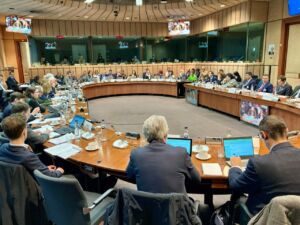Today in Brussels, Belgium, the EU-Central Asia Drug Dialogue has been conducted under the chairmanship of
Spain – regular annual dialogue aiming to strengthen international cooperation, exchange views and support
the proper development of drug policies. EU-funded Central Asia Drug Action Programme (CADAP) supported
the participation in the Dialogue of delegations from all 5 Central Asian countries (Kazakhstan, Kyrgyzstan,
Turkmenistan, Uzbekistan) among the representatives of relevant state institutions, whose activities include
countering drug smuggling and developing state policy in the field of drugs.
The European Union provided an update on drugs policy and drugs situation in the EU, including on the
evaluation of the implementation of the EU Drugs Strategy and Action Plan 2021-2025. It was followed by an
update on drugs policy and drugs situation in Central Asia countries, with recent developments and trends.
The general overview of the collaboration between the EU and Central Asia in the field of drugs was given as
well as the presentation of CADAP and other regional EU funded programmes. Finally, emerging challenges
focusing on the drug situation in Afghanistan: methamphetamine and heroin production, and trafficking and
other recent developments and trends were discussed.
EU side was represented by EU Member States and representatives of the EU institutions and agencies such
as the European Commission, the European Monitoring Centre of Drugs and Addictions, EUROPOL, the
European External Action Service and General Secretariat of the Council of Europe. Particularly, the European
Commission presented the EU Drugs Strategy 2021-2025 and its Action Plan 2021-2025 and EU agencies shared
the information on recent development in the EU.
Expert dialogues on drugs are the fundamental part of the EU Drugs Strategy 2021-2025 that strongly supports
information sharing on the strategies, aims and relevant initiatives through the dialogues on drugs with
international partners, both at regional and bilateral level. Dialogues are typically based on multilateral
partnership and cooperation with representatives of various regions or EU long-term partners. The goal is to
address the experts from the countries outside of the EU and exchange views concerning the drug situation,
both at regional and international level



